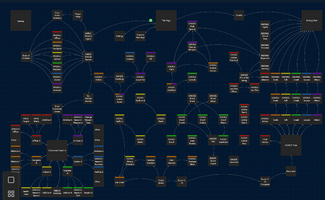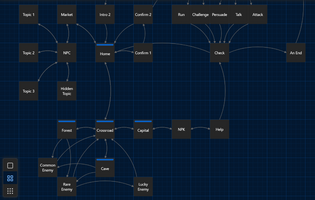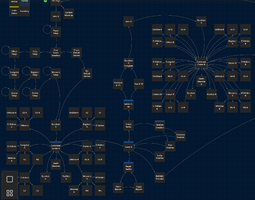Iteration Process




I honestly would have stopped after my first two ideas (one where you raise a blob, and a medieval RPG) were it not for the minimum of creating three of them. To the side I was re-watching Futurama and thought, “A space game where you try to keep everyone alive.” This was the most popular idea out of the feedback I received, but I figured it may be too ambitious. My rough draft version was of the medieval RPG, and even then, I was struggling to come up with interesting paths for the player to take. After some discussion with others, once again the space idea was deemed the best of the five that I had.
Working off the rough draft I had already made, the player would be able to talk to NPCs, travel to different locations, have random encounters, and finally choose one of several ways to beat the game. If you compare the final version of the game with my rough draft, you could see the similarities. I am quite surprised and happy that it turned out this way.
For my game, most choices the player makes will be denoted by their own speech or words. The game will then describe the player doing such actions from the second person point of view. I felt this way of writing to be the most natural to my idea of interactive fiction. I tried to make the dialogue formal as much as possible, but I did let some character slip through as I thought about Star Trek.
I cut down on some of the lengthier text blocks in the beginning of the game. This included removing superfluous text or stowing them away in a (link-reveal: “”). I would love to talk more about the choices I present to players, but I fear that would spoil some of the game. Players will experience events in a random order each time they play, but it is up to them to make choices within these events, and to talk to their crew members to win.
For the beta version, most win conditions were grouped together into a few events for time constraints. It was playable the way it was, but one play tester said the ending felt abrupt. I felt this way as well and was able to come up with more events that had their own prize. I also made the ending paths more pronounced; the player would be able to freely view each one and confirm which plan they wanted to enact after deliberation.
My first play test was done the day before we were to share our beta versions with our class. They were overwhelmed by having to click through every crew member and being prompted to name them. Then, they went through the limited dialogue option of “Any advice?” which was full of very unhelpful advice. Then they went through the events available at the time. When the events have been exhausted, the game will default to the dialogue, “This doesn’t seem to be the right way.” They had already made up their minds that the crew was unhelpful, so I had to intervene and direct them back to try to talk to them again.
My next play test was by a person in my class. Unfortunately a change I had made to the game resulted in them being stuck at one point. This was in one of the dialogue options, so it was avoidable the second time around. They, too, were confused about what to do when the events ran out.
I had a play tester on Discord, who was the one to call my endings abrupt, and they agreed that an alert to talk to your crew was needed. The day after turning in the beta, I added an NPC alert system that would request the player return to the hub and talk to one or more of the NPCs. I added the events, spread out the rewards, elongated the endings. I proofread the game several times, and had a few people test the game again. It was just what I needed to get the game into a state I can finally be truly happy with.
I took the three-act story structure to heart, and the game was originally going to have three large areas. After writing the gameplay needed to pass through the first area, the idea of doing the same thing again two more times was discouraging. I decided to move the acts from each area, into the intro, the search class, and the ending. If you look at the Command Center hub, I originally had an exact duplicate of that cluster of passages for use in the second area. Deleting that was such a relief.
I would say one of the more problematic technical challenges I had with the game would be the random events. In my rough draft, I had two encounters that would appear based off a number generator. However, this was assuming the player would be in an RPG and grinding the same monsters for levels. I did not want my players in space to encounter the same dogfight event repeatedly, so I had to make use of arrays. This was fine, but I wanted to make it even more interesting, and keep the essence of random events. So I made use of the (shuffled: ) macro to randomize the order of them. Then I simply had to check if the array of events was empty, and have the player be redirected to “This doesn’t seem to be the right way,” If so.
(Note: This is a modified version of a previous class assignment concerning the title topic)
Imprisoned Space
Commence Rescue Mission
| Status | Released |
| Author | Cheeptune |
| Genre | Interactive Fiction, Adventure |
| Tags | Aliens, Character Customization, Exploration, Indie, Multiple Endings, Sci-fi, Singleplayer, Text based, Violent |
| Languages | English |
Leave a comment
Log in with itch.io to leave a comment.